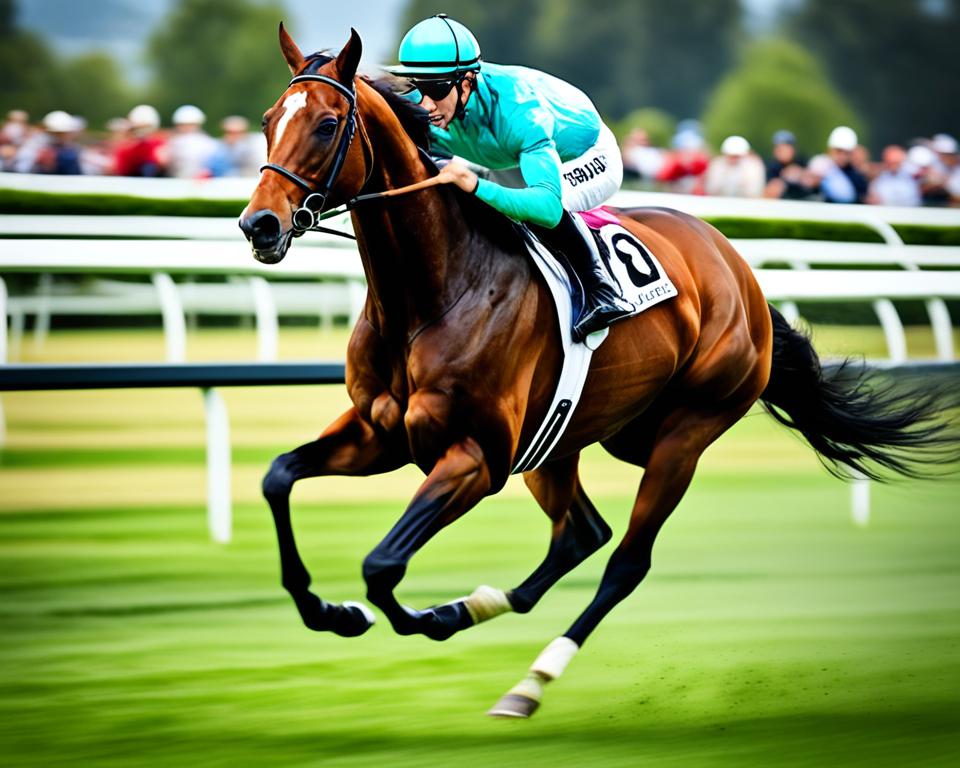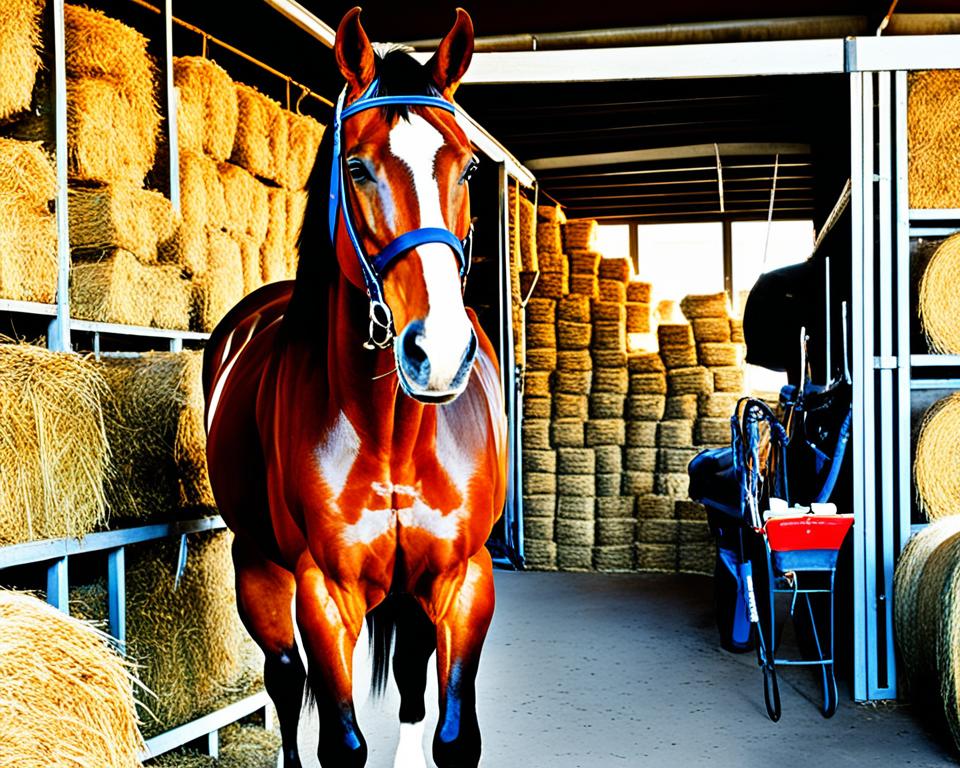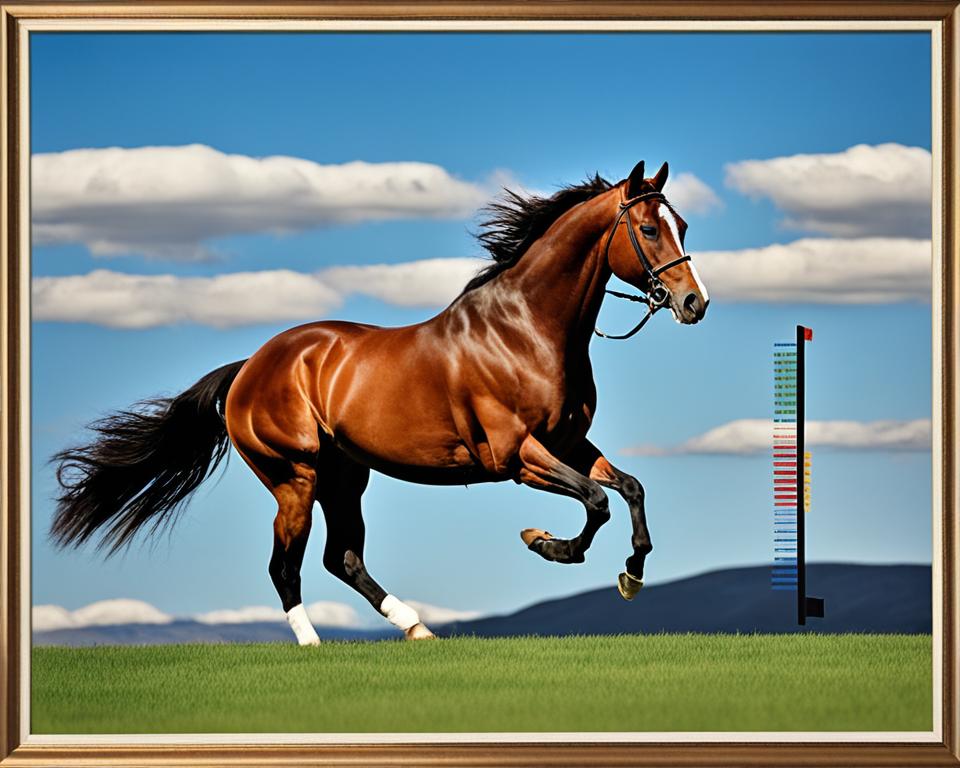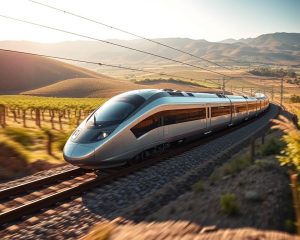
Owning a racing horse is a thrilling and exhilarating experience, but it also comes with a significant financial commitment. In this comprehensive guide, we will explore the various costs associated with purchasing, training, breeding, and maintaining a thoroughbred racehorse. From the initial investment to the ongoing expenses, this article aims to provide you with a clear understanding of the financial realities of racehorse ownership.
Read interesting things at : web-quanto
Key Takeaways
- The cost of a racing horse can vary widely, from hundreds of thousands to millions of dollars, depending on factors like pedigree and performance.
- Ongoing expenses for racehorse ownership can add up quickly, including boarding, feed, training, veterinary care, and insurance.
- Breeding a successful racehorse can be a lucrative investment, but the associated costs must be carefully considered.
- Understanding the various ownership structures and navigating the auction process are crucial for prospective owners.
- Securing appropriate insurance coverage and managing risks are essential for the long-term financial security of racehorse ownership.
Exploring the World of Racehorse Ownership
Owning a racing horse is a unique and exhilarating experience, offering the opportunity to be part of the dynamic world of thoroughbred racing. From the adrenaline rush of watching your horse cross the finish line to the camaraderie of the racing community, the thrill of racehorse ownership is undeniable.
The Thrill of Owning a Racing Horse
The thrill of racehorse ownership is unparalleled, providing a sense of pride and accomplishment that transcends the financial aspects of the sport. Witnessing your horse’s triumphs on the racetrack is a truly exhilarating experience, fostering a deep connection between the owner and their equine champion.
Factors Influencing Racehorse Costs
However, the cost of acquiring and maintaining a racehorse can vary significantly, depending on factors such as the horse’s pedigree, race records, and physical attributes. Understanding these factors is crucial in determining the financial commitment required for racehorse ownership.
The pedigree of a racehorse can greatly influence its perceived value and potential for success on the racetrack, with horses from renowned bloodlines often commanding higher prices. Additionally, a horse’s racing records, including wins, placings, and prize money earned, can significantly impact its market value. The conformation and physical characteristics of the horse, such as its build, soundness, and athleticism, are also critical considerations in determining its worth.
Prospective racehorse owners must carefully weigh these factors to ensure they make an informed decision that aligns with their financial capabilities and investment goals.
Purchasing a Racehorse: Initial Investment
The decision to purchase a racehorse involves a significant financial commitment, with the initial investment ranging from hundreds of thousands to millions of dollars. This price tag is largely dependent on the horse’s pedigree and proven performance on the racetrack.
Auction Prices and Pedigree Significance
Thoroughbred auctions, such as the prestigious Keeneland and Fasig-Tipton sales, attract buyers from around the world, all vying for horses with impressive bloodlines and racing histories. The significance of a racehorse’s pedigree cannot be overstated, as it can greatly influence its potential value and future success. Buyers at these high-profile events understand that a horse’s lineage can be a strong indicator of its genetic potential, making the pedigree a crucial factor in determining the final auction price.
Private Purchase Options
While the auction arena offers a thrilling and competitive environment for racehorse acquisition, private purchase options may present more accessible entry points into racehorse ownership. These private transactions, however, often require extensive due diligence to ensure the horse’s soundness, performance potential, and overall suitability for the buyer’s intended goals. Prospective owners must carefully weigh the advantages and risks of both auction and private purchase avenues to determine the most suitable path for their racehorse investment.
| Racehorse Acquisition Method | Average Price Range | Key Considerations |
|---|---|---|
| Thoroughbred Auctions | $100,000 – $5 million+ |
|
| Private Purchase | $20,000 – $1 million+ |
|
Ongoing Expenses: Maintenance and Training
While the initial purchase of a racehorse can be a significant investment, the ongoing expenses associated with owning and maintaining a thoroughbred racehorse can be equally substantial. These recurring costs are essential to ensure the health, well-being, and optimal performance of the horse.
Boarding and Feed Costs
One of the most significant ongoing expenses for racehorse owners is the cost of boarding and feeding their horses. High-quality stabling and specialized equine nutrition can quickly add up, with daily rates ranging from hundreds to thousands of dollars, depending on the facility and location. Proper housing, bedding, and a balanced diet are crucial for maintaining the racehorse’s physical condition and supporting its training regimen.
Professional Training Fees
Racehorses require the expertise and guidance of skilled trainers to reach their full potential. Professional training fees can be a substantial and ongoing expense, as owners must pay for the trainer’s services, as well as the costs associated with jockeys, exercise riders, and other support staff. These training costs are essential for developing the horse’s skills, fitness, and race-day performance.
Veterinary Care and Insurance
Maintaining the health and well-being of a racehorse is paramount, and the associated veterinary costs can be significant. Regular check-ups, medical treatments, and preventative care can quickly add up, especially in the event of injuries or illnesses. Additionally, owners often invest in insurance policies to protect their financial investment and manage the risks inherent to racehorse ownership.
How Much Does a Racing Horse Cost?
The overall cost of a racing horse can vary significantly, depending on various factors.
On average, the purchase price of a thoroughbred racehorse can range from $20,000 to several million dollars, with the most valuable horses often sold at elite auctions like Keeneland and Fasig-Tipton. These high-profile events attract buyers from around the world, bidding on horses with impressive bloodlines and racing histories.
Average Costs for Purchasing a Racehorse
The cost of acquiring a racehorse can be influenced by the horse’s pedigree, performance records, and physical attributes. Racehorses with proven success on the track or desirable bloodlines can command much higher prices, often reaching the multi-million dollar range. Conversely, less experienced or unproven horses may be available for more accessible prices, making them attractive options for those new to racehorse ownership.
Typical Annual Maintenance Expenses
Beyond the initial investment, the annual maintenance expenses for owning a racehorse can add up quickly. Factors such as boarding, training, veterinary care, and insurance can collectively total $50,000 or more per year. Prospective owners must carefully consider these ongoing costs and plan their budgets accordingly to ensure the financial sustainability of racehorse ownership.
| Expense Category | Estimated Annual Cost |
|---|---|
| Boarding | $20,000 – $30,000 |
| Training | $15,000 – $25,000 |
| Veterinary Care | $5,000 – $10,000 |
| Insurance | $3,000 – $5,000 |
| Total Estimated Annual Expenses | $50,000 – $70,000 |
Racehorse Breeding: A Lucrative Investment
For some racehorse owners, the potential for breeding and stud fees can be a lucrative investment. Successful racehorses with desirable thoroughbred racehorse value can command high stud fees, which can generate significant revenue for their owners. However, the racehorse breeding expenses associated with breeding, including veterinary expenses, mare care, and foal management, can also be substantial.
Stud Fees and Breeding Costs
The stud fees for top-performing racehorses can range from tens of thousands to millions of dollars, depending on the horse’s pedigree, racing records, and industry demand. These fees represent a significant racehorse investment cost for breeders, but they also offer the potential for substantial returns. Alongside stud fees, the breeding process itself incurs various expenses, such as veterinary care, feed, and specialized facilities, all of which must be carefully factored into the overall racehorse breeding expenses.
Potential Returns on Investment
For owners who successfully navigate the breeding market, the potential returns can be substantial. Foals from high-value sires and dams can fetch impressive prices at auction, potentially recouping the initial racehorse investment cost and generating significant profits. Additionally, successful breeding programs can provide a steady stream of revenue through ongoing stud fees, further enhancing the financial viability of thoroughbred racehorse value as an investment strategy.
Factors Affecting Racehorse Value
The value of a racehorse is a complex and multifaceted consideration, driven by a variety of factors that can significantly impact its perceived worth within the thoroughbred industry. From the horse’s pedigree and bloodlines to its performance history and physical attributes, each element plays a crucial role in determining the racehorse’s thoroughbred racehorse value, racehorse prices, and overall racehorse investment cost.
Pedigree and Bloodlines
A racehorse’s pedigree, which traces its lineage to renowned sires and dams, is one of the primary drivers of its value. Horses with impressive bloodlines, boasting a history of successful racehorses and proven breeding, are highly sought after by buyers. The reputation and performance of a horse’s ancestors can greatly influence its perceived potential for success on the track, ultimately translating into a higher racehorse investment cost.
Performance and Racing Records
A racehorse’s proven performance and racing records are also crucial factors in determining its market value. Horses with a track record of wins, placings, and substantial prize money earnings are highly prized by owners and investors. These successful racehorses command racehorse prices that reflect their proven ability to excel on the racetrack, making them a valuable asset for those seeking a thoroughbred racehorse value investment.
Conformation and Physical Attributes
The physical characteristics and overall conformation of a racehorse play a significant role in its perceived value. Factors such as the horse’s build, soundness, and athletic ability are closely evaluated by buyers and trainers. Racehorses with superior conformation and desirable physical attributes are more likely to command higher racehorse prices and be considered a worthwhile racehorse investment cost.
Ownership Structures and Partnerships
Racehorse ownership can be structured in various ways, offering prospective owners different levels of control and financial investment. Understanding the nuances of sole ownership versus racing partnerships is crucial when determining the most suitable option for your
how much racing horse cost
,
racehorse investment cost
, and
buying a racehorse
goals.
Sole Ownership vs. Racing Partnerships
Sole ownership provides the thrill of full control over the racehorse’s management and the potential for greater rewards. However, this ownership structure also carries the burden of all expenses and risks associated with the horse’s care, training, and racing career. Conversely, racing partnerships allow for shared ownership and the distribution of costs, but may involve compromises in decision-making and potential returns.
Advantages and Disadvantages of Each Option
Sole ownership offers the opportunity to make unilateral decisions regarding the horse’s training, racing schedule, and breeding plans. This level of control can be highly rewarding, but it also requires a significant financial commitment, as the owner is responsible for all expenses related to the racehorse investment cost. Racing partnerships, on the other hand, provide a more accessible entry point into the sport, as the financial burden is shared among multiple owners. However, this structure may necessitate compromises and collaborative decision-making, which could impact the ultimate outcome and how much racing horse cost.
Prospective owners must carefully weigh the advantages and disadvantages of each ownership structure to determine the most suitable option for their individual circumstances and buying a racehorse goals. Factors such as financial resources, risk tolerance, and desired level of involvement should all be considered when making this important decision.
Racehorse Auctions: Navigating the Process
Thoroughbred auctions, such as those hosted by prestigious organizations like Keeneland and Fasig-Tipton, have long been a popular avenue for acquiring high-quality racehorses. These prestigious events attract buyers from around the world, all seeking the next generation of equine champions to add to their stables.
Major Auction Houses and Events
Keeneland and Fasig-Tipton are two of the most renowned auction houses in the world of thoroughbred racing. Their sales events, held throughout the year, offer a diverse selection of racehorses, from young prospects to proven performers. Understanding the nuances of these auction houses and the significance of the various sale types, such as yearling, 2-year-old, and breeding stock auctions, is crucial for prospective racehorse buyers.
Tips for Successful Bidding
Navigating the auction process can be a thrilling yet daunting experience, particularly for first-time racehorse buyers. Developing effective bidding strategies and knowing when to walk away can help ensure a prudent investment. Careful research into a horse’s pedigree, performance history, and physical attributes can provide valuable insights to guide the bidding process. Additionally, having a clear understanding of your budget and investment goals can help you make informed decisions and avoid getting caught up in the excitement of the auction.
Insurance and Risk Management
Owning a
racehorse
involves inherent risks, both to the animal and the owner’s
racehorse investment cost
. Securing appropriate insurance coverage is essential to mitigate these risks.
Types of Insurance for Racehorses
Various types of insurance, such as mortality, medical, and liability policies, can provide protection against unexpected events, injuries, and potential legal liabilities. These policies can help safeguard the
how much racing horse cost
and ensure the financial viability of racehorse ownership.
Mitigating Risks and Potential Liabilities
Careful consideration of the available insurance options and effective risk management strategies can help ensure the long-term viability and financial security of
racehorse ownership fees
. By proactively addressing potential risks, owners can minimize the impact of unforeseen circumstances and focus on the thrill and rewards of the sport.

Tax Implications of Racehorse Ownership
Racehorse ownership carries unique tax implications that owners must understand and navigate. The costs associated with the purchase, training, and maintenance of racehorses may be eligible for certain tax deductions, providing potential financial benefits to owners. Conversely, any prize money or breeding revenue generated from the racehorse’s performance can be subject to taxation.
To ensure compliance with relevant tax laws and optimize the financial outcomes of racehorse ownership, it is highly recommended that owners consult with a qualified tax professional. These experts can provide guidance on navigating the complex tax landscape, identifying eligible deductions, and managing the tax implications of the various revenue streams associated with racehorse ownership.
By working closely with a tax professional, racehorse owners can make informed decisions, minimize their tax liabilities, and maximize the financial returns on their racehorse investment cost and racehorse ownership fees. This strategic approach can help offset the significant how much racing horse cost and ensure the long-term viability and sustainability of their equestrian endeavors.
The Emotional and Intangible Rewards
Beyond the financial considerations, owning a racehorse can provide immense emotional and intangible rewards. The thrill of watching your horse compete and potentially emerge victorious is unparalleled, fostering a deep sense of pride and accomplishment. The how much racing horse cost and the racehorse investment cost can be worth it for this exhilarating experience.
The Thrill of Racehorse Ownership
The adrenaline rush of seeing your racehorse cross the finish line ahead of the competition is a feeling that transcends the financial aspects of the sport. Owners are often captivated by the pure athleticism and determination of their horses, creating a deep personal connection that goes beyond the buying a racehorse process.
Building Connections and Networking
In addition to the thrill of the race, racehorse ownership often facilitates the building of connections and networks within the vibrant equestrian community. Owners have the opportunity to engage with fellow enthusiasts, trainers, and industry professionals, fostering camaraderie, collaboration, and shared experiences that transcend the financial aspect of the sport.
Success Stories and Notable Racehorses
The world of thoroughbred racing is filled with awe-inspiring tales of equine excellence and record-breaking achievements. These stories serve as a testament to the dedication, passion, and financial commitment that define the realm of racehorse ownership.
Inspiring Tales of Triumph
From humble beginnings to the pinnacles of success, some racehorses have captivated audiences and etched their names in the annals of racing history. Take the example of Secretariat, the legendary American Triple Crown winner who set records that still stand today. His awe-inspiring performances and the $6.08 million price tag at his 1973 Claiborne Farm sale exemplify the thoroughbred racehorse value that can be attained through unparalleled ability and enduring legacy.
Record-Breaking Racehorses and Their Values
The racing industry is no stranger to remarkable racehorses that have commanded staggering racehorse prices. Fusaichi Pegasus, a Japanese-bred horse, was purchased for a record-breaking $70 million in 2000, highlighting the immense financial commitment required for racehorse investment cost. Similarly, California Chrome, the winner of the 2014 Kentucky Derby and Preakness Stakes, was valued at an estimated $12 million, further demonstrating the extraordinary value placed on exceptional racing talent.
These inspiring stories and the impressive valuations of record-breaking racehorses serve as a testament to the passion, dedication, and financial commitment that define the world of thoroughbred racing. They captivate audiences, ignite dreams, and underscore the remarkable potential of these equine athletes to captivate the hearts and minds of racehorse enthusiasts worldwide.
Weighing the Costs and Benefits
Owning a
racing horse
is a significant financial and emotional commitment that requires careful consideration. Prospective owners must weigh the
costs
, including the
initial investment
,
ongoing maintenance expenses
, and potential risks, against the thrill and rewards of the sport.
Is Racehorse Ownership Right for You?
Before taking the plunge into racehorse ownership, it’s crucial to assess your financial capabilities and personal circumstances. Consider the how much racing horse cost, the racehorse investment cost, and whether buying a racehorse aligns with your long-term goals and risk tolerance. Carefully evaluate your available resources, budget, and the potential impact on your lifestyle and other commitments.
Realistic Expectations and Financial Planning
Developing realistic expectations is essential for a fulfilling racehorse ownership experience. Understand that the costs can escalate quickly, from the initial investment to the ongoing maintenance and potential veterinary expenses. Engage in thorough financial planning to ensure the long-term sustainability of your involvement in the sport, balancing your passion for racing with the practical realities of the financial commitment.

Ultimately, the decision to become a racehorse owner should be an informed one, weighing the costs and benefits with care and consideration. By understanding the financial landscape and aligning your expectations with the realities of the sport, you can embark on a thrilling and rewarding journey as a racehorse owner.
Conclusion
In conclusion, the cost of owning a racing horse is a complex and multi-faceted topic, with a range of factors influencing the overall financial commitment. From the initial racehorse investment cost to the ongoing expenses, the world of racehorse ownership requires a deep understanding of the various costs and a willingness to invest both financially and emotionally.
By exploring the insights and considerations outlined in this comprehensive guide, prospective owners can make informed decisions and navigate the thrilling, yet demanding, landscape of thoroughbred racing. Understanding the factors that contribute to how much a racing horse cost, such as racehorse prices and the costs associated with purchasing, training, and maintaining a racehorse, is crucial for ensuring the long-term viability and enjoyment of this rewarding pursuit.
Ultimately, the decision to become a racehorse owner should be based on a careful evaluation of one’s financial capabilities, risk tolerance, and passion for the sport. By carefully weighing the costs and benefits, prospective owners can determine if buying a racehorse is the right choice for them, and embark on a journey that offers not only the potential for financial rewards but also the unparalleled thrill of witnessing their equine partners excel on the racetrack.







